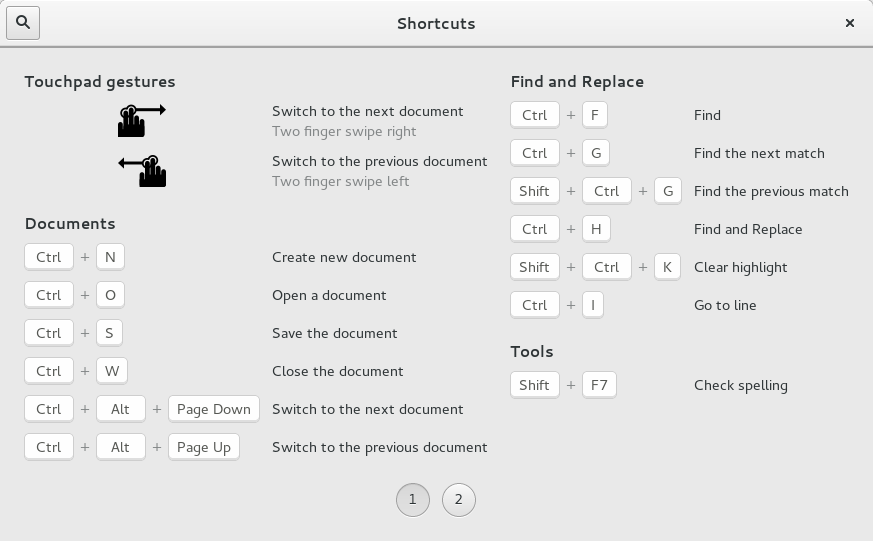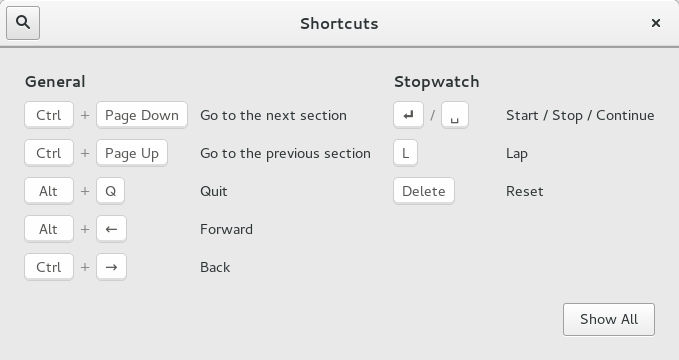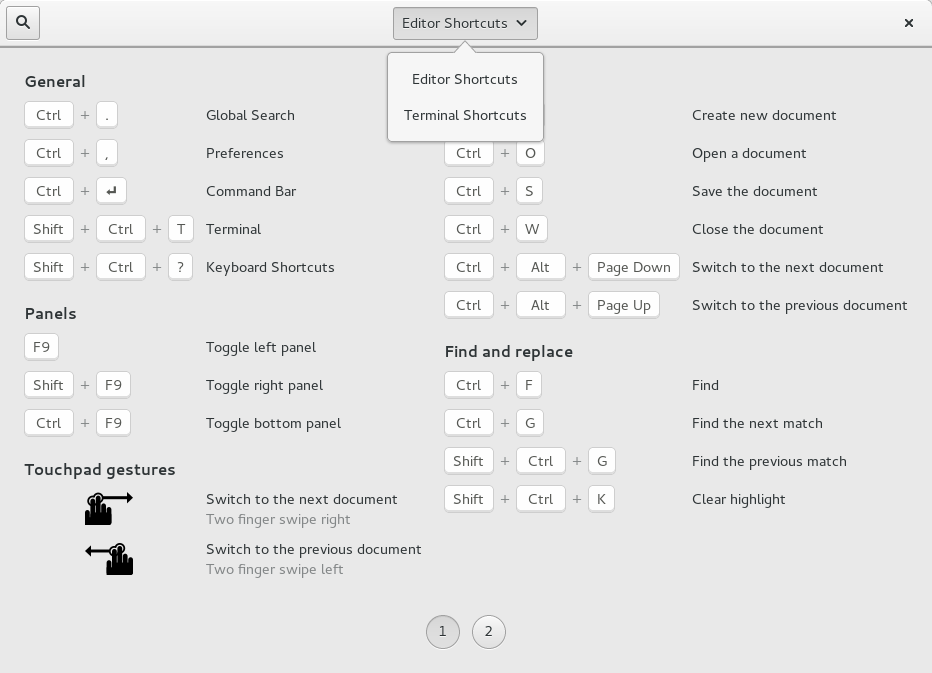Struct gtk4::ShortcutsWindow [−][src]
pub struct ShortcutsWindow(_);Expand description
A ShortcutsWindow shows information about the keyboard shortcuts
and gestures of an application.
The shortcuts can be grouped, and you can have multiple sections in this window, corresponding to the major modes of your application.
Additionally, the shortcuts can be filtered by the current view, to avoid showing information that is not relevant in the current application context.
The recommended way to construct a ShortcutsWindow is with
Builder, by populating a ShortcutsWindow with one or
more ShortcutsSection objects, which contain GtkShortcutsGroups
that in turn contain objects of class ShortcutsShortcut.
A simple example:

This example has as single section. As you can see, the shortcut groups are arranged in columns, and spread across several pages if there are too many to find on a single page.
The .ui file for this example can be found here.
An example with multiple views:

This example shows a ShortcutsWindow that has been configured to show only
the shortcuts relevant to the “stopwatch” view.
The .ui file for this example can be found here.
An example with multiple sections:

This example shows a ShortcutsWindow with two sections, “Editor Shortcuts”
and “Terminal Shortcuts”.
The .ui file for this example can be found here.
Implements
GtkWindowExt, WidgetExt, glib::ObjectExt, AccessibleExt, BuildableExt, ConstraintTargetExt, NativeExt, RootExt, ShortcutManagerExt, WidgetExtManual, AccessibleExtManual
Implementations
Creates a new builder-pattern struct instance to construct ShortcutsWindow objects.
This method returns an instance of ShortcutsWindowBuilder which can be used to create ShortcutsWindow objects.
The name of the section to show.
This should be the section-name of one of the ShortcutsSection
objects that are in this shortcuts window.
The name of the section to show.
This should be the section-name of one of the ShortcutsSection
objects that are in this shortcuts window.
The view name by which to filter the contents.
This should correspond to the property::ShortcutsGroup::view
property of some of the ShortcutsGroup objects that
are inside this shortcuts window.
Set this to None to show all groups.
The view name by which to filter the contents.
This should correspond to the property::ShortcutsGroup::view
property of some of the ShortcutsGroup objects that
are inside this shortcuts window.
Set this to None to show all groups.
Emitted when the user uses a keybinding to close the window.
This is a keybinding signal.
The default binding for this signal is the Escape key.
Emitted when the user uses a keybinding to start a search.
This is a keybinding signal.
The default binding for this signal is Control-F.
Trait Implementations
This method returns an ordering between self and other values if one exists. Read more
This method tests less than (for self and other) and is used by the < operator. Read more
This method tests less than or equal to (for self and other) and is used by the <=
operator. Read more
This method tests greater than (for self and other) and is used by the > operator. Read more
Returns the type identifier of Self.
Auto Trait Implementations
impl RefUnwindSafe for ShortcutsWindow
impl !Send for ShortcutsWindow
impl !Sync for ShortcutsWindow
impl Unpin for ShortcutsWindow
impl UnwindSafe for ShortcutsWindow
Blanket Implementations
Mutably borrows from an owned value. Read more
Upcasts an object to a superclass or interface T. Read more
Upcasts an object to a reference of its superclass or interface T. Read more
Tries to downcast to a subclass or interface implementor T. Read more
Tries to downcast to a reference of its subclass or interface implementor T. Read more
Tries to cast to an object of type T. This handles upcasting, downcasting
and casting between interface and interface implementors. All checks are performed at
runtime, while downcast and upcast will do many checks at compile-time already. Read more
Tries to cast to reference to an object of type T. This handles upcasting, downcasting
and casting between interface and interface implementors. All checks are performed at
runtime, while downcast and upcast will do many checks at compile-time already. Read more
Casts to T unconditionally. Read more
Casts to &T unconditionally. Read more
Returns true if the object is an instance of (can be cast to) T.
pub fn set_property<'a, N, V>(
&self,
property_name: N,
value: V
) -> Result<(), BoolError> where
N: Into<&'a str>,
V: ToValue,
pub fn set_property_from_value<'a, N>(
&self,
property_name: N,
value: &Value
) -> Result<(), BoolError> where
N: Into<&'a str>,
pub fn set_properties_from_value(
&self,
property_values: &[(&str, Value)]
) -> Result<(), BoolError>
pub fn has_property<'a, N>(&self, property_name: N, type_: Option<Type>) -> bool where
N: Into<&'a str>,
pub fn find_property<'a, N>(&self, property_name: N) -> Option<ParamSpec> where
N: Into<&'a str>,
Safety Read more
Safety Read more
Safety Read more
Safety Read more
pub fn connect<'a, N, F>(
&self,
signal_name: N,
after: bool,
callback: F
) -> Result<SignalHandlerId, BoolError> where
N: Into<&'a str>,
F: 'static + Fn(&[Value]) -> Option<Value> + Send + Sync,
Same as connect but takes a SignalId instead of a signal name.
pub fn connect_local<'a, N, F>(
&self,
signal_name: N,
after: bool,
callback: F
) -> Result<SignalHandlerId, BoolError> where
N: Into<&'a str>,
F: 'static + Fn(&[Value]) -> Option<Value>,
Same as connect_local but takes a SignalId instead of a signal name.
pub unsafe fn connect_unsafe<'a, N, F>(
&self,
signal_name: N,
after: bool,
callback: F
) -> Result<SignalHandlerId, BoolError> where
N: Into<&'a str>,
F: Fn(&[Value]) -> Option<Value>,
Same as connect_unsafe but takes a SignalId instead of a signal name.
Emit signal by signal id.
Same as emit but takes Value for the arguments.
Emit signal by its name.
Same as emit_by_name but takes Value for the arguments.
Emit signal with details by signal id.
Same as emit_with_details but takes Value for the arguments.
pub fn connect_notify<F>(&self, name: Option<&str>, f: F) -> SignalHandlerId where
F: 'static + Fn(&T, &ParamSpec) + Send + Sync,
pub fn connect_notify_local<F>(
&self,
name: Option<&str>,
f: F
) -> SignalHandlerId where
F: 'static + Fn(&T, &ParamSpec),
pub unsafe fn connect_notify_unsafe<F>(
&self,
name: Option<&str>,
f: F
) -> SignalHandlerId where
F: Fn(&T, &ParamSpec),
pub fn bind_property<'a, O, N, M>(
&'a self,
source_property: N,
target: &'a O,
target_property: M
) -> BindingBuilder<'a> where
O: ObjectType,
N: Into<&'a str>,
M: Into<&'a str>,
Returns a SendValue clone of self.